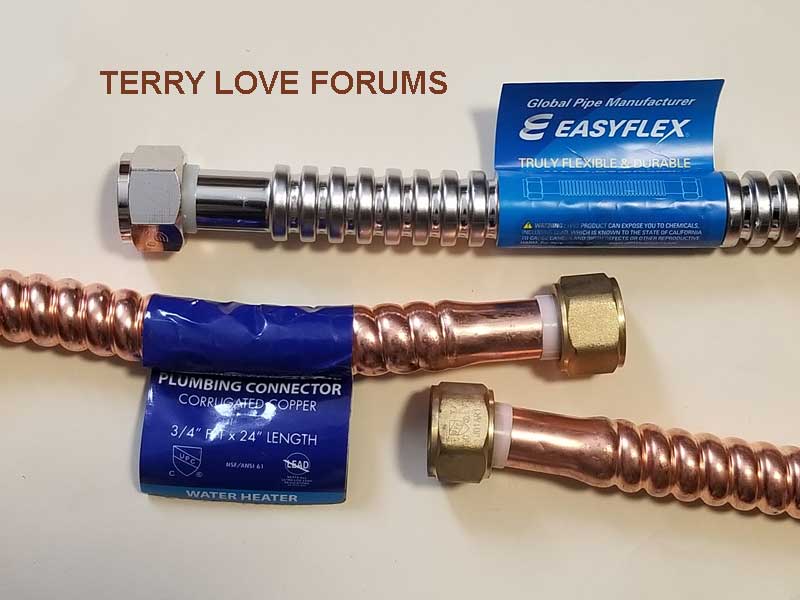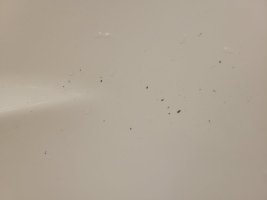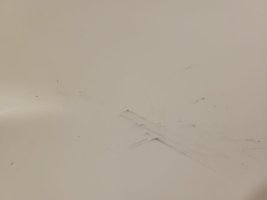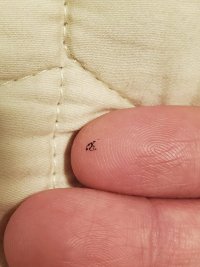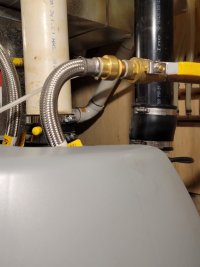JaceHunter
New Member
Hey all!
I've read through the other posts on this forum on black specks in water but am running into a bit of a cluster with my issue.
I had some really bad corrosion on my hot water tank nipples and had the whole tank replaced in October. Catch is the plumber tried pulling the nipples after cutting both copper pipes then couldn't so he reconnected the pipes and came back the next day with a new tank... When I went to fill baths that day we had a bunch of corroded metal chunks pouring out into the tubs. I was chapped but it made sense. Plumber came back the next morning and replaced the tank and instead of re-piping in copper installed braided hoses and no dielectric unions. I mentioned the chunks and as expected he said that it shouldn't be a problem just run the hot for a bit and it'll flush out.
So after the tank was replaced we had a couple days where we still had these flakes then it seemed to clear up. Off and on I'd find a speck or two floating in a bath but over the last few weeks its really ramped up to the point now where it's all over but still sporadic. Filled my son's bath last night and had a lot of flakes, drained then re-filled and had no issue. Filled daughter's bath (2nd tub) and had a medium amount. Tank was replaced mid October and we are now at Jan 1.
I went to the basement to check hoses and noticed the cold intake was leaking (failed at the crimp) but nothing else of note. Plumber came back and replaced the hose but said he's never heard of black flecks coming out of the hot water tank before. I reminded him of the tank repair situation but he didn't remember. I told him it's coming out of both bath tub faucets upstairs so I'm expecting the sinks to have some too - maybe the aerators are blocking the big stuff. He pulled an aerator and sure enough there were black flakes in it.
With all the long winded background out of the way - Plumber has no clue what could be causing the issue. I asked about sediment still in the pipes from when he re-connected the original tank after trying to remove the corroded nipples but I said it doesn't make sense to me that we would have it ramping up like this three months later. He agreed. Said he'd ask around but left with no solution at all. I'm debating calling my local lab to see if they will pull a sample to tell me what is in the water - figured this might help narrow things down. I also haven't drained the tank yet so that's on the to-do list tonight. Any other suggestions on how I should move ahead with this?
Flakes both float and sink. Some smear, some are hard like metal and break apart when pushed against a hard surface. I'll upload some pics in a sec but it's the same as others have noted.
Thanks in advance to anyone who takes the time to read / reply. At a bit of a loss since the plumber just shrugged and ran off.
I've read through the other posts on this forum on black specks in water but am running into a bit of a cluster with my issue.
I had some really bad corrosion on my hot water tank nipples and had the whole tank replaced in October. Catch is the plumber tried pulling the nipples after cutting both copper pipes then couldn't so he reconnected the pipes and came back the next day with a new tank... When I went to fill baths that day we had a bunch of corroded metal chunks pouring out into the tubs. I was chapped but it made sense. Plumber came back the next morning and replaced the tank and instead of re-piping in copper installed braided hoses and no dielectric unions. I mentioned the chunks and as expected he said that it shouldn't be a problem just run the hot for a bit and it'll flush out.
So after the tank was replaced we had a couple days where we still had these flakes then it seemed to clear up. Off and on I'd find a speck or two floating in a bath but over the last few weeks its really ramped up to the point now where it's all over but still sporadic. Filled my son's bath last night and had a lot of flakes, drained then re-filled and had no issue. Filled daughter's bath (2nd tub) and had a medium amount. Tank was replaced mid October and we are now at Jan 1.
I went to the basement to check hoses and noticed the cold intake was leaking (failed at the crimp) but nothing else of note. Plumber came back and replaced the hose but said he's never heard of black flecks coming out of the hot water tank before. I reminded him of the tank repair situation but he didn't remember. I told him it's coming out of both bath tub faucets upstairs so I'm expecting the sinks to have some too - maybe the aerators are blocking the big stuff. He pulled an aerator and sure enough there were black flakes in it.
With all the long winded background out of the way - Plumber has no clue what could be causing the issue. I asked about sediment still in the pipes from when he re-connected the original tank after trying to remove the corroded nipples but I said it doesn't make sense to me that we would have it ramping up like this three months later. He agreed. Said he'd ask around but left with no solution at all. I'm debating calling my local lab to see if they will pull a sample to tell me what is in the water - figured this might help narrow things down. I also haven't drained the tank yet so that's on the to-do list tonight. Any other suggestions on how I should move ahead with this?
Flakes both float and sink. Some smear, some are hard like metal and break apart when pushed against a hard surface. I'll upload some pics in a sec but it's the same as others have noted.
Thanks in advance to anyone who takes the time to read / reply. At a bit of a loss since the plumber just shrugged and ran off.
Last edited:

